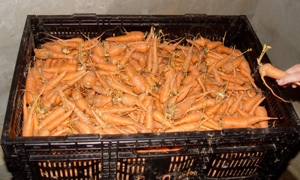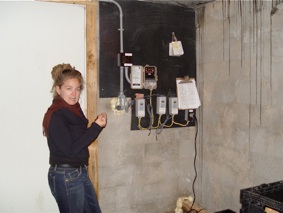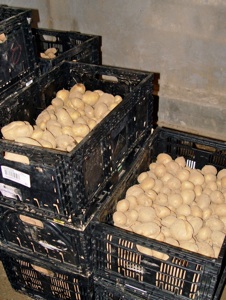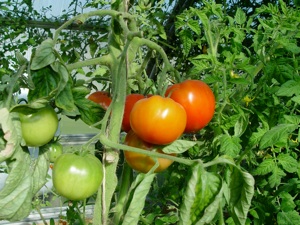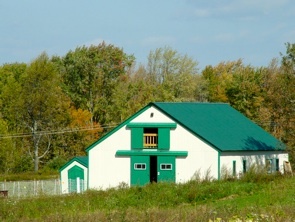Name: Unity College Sustainability &
Veggies for All
Address: Sara Trunzo
Farm & Food Projects
Unity College Sustainability
90 Quaker Hill Road
Unity, Maine 04988
Phone: 800-624-1024
Website for Unity College: www.unity.edu
Website for Unity College Sustainability:
http://sustainabilitymonitor.wordpress.com/
Website for Veggies For All:
http://www.veggiesforall.org/vfa_home.html
Website for Volunteer Regional Food Pantry:
Email: strunzo@unity.edu
What Makes Unity College Sustainability
and Veggies for All Unique?
In a project which highlights so many diverse sustainable farming operations in Maine, it would be remiss to neglect the work taking place at Unity College. The school may be considered, by some, to be somewhat small in size with an enrollment of only 540 students, but its history and focus contribute to positioning it as a major educational force in sustainable agriculture. As stated on the Unity College website, “Sustainability is not an add-on at Unity College. It’s what we do.”
After visiting Unity College, it is apparent that
the school is succeeding in fostering sustainability in all facets of the educational experience. Each student earning a baccalaureate degree at the college is required to study the Environmental Citizen Curriculum. Degrees are offered in many environmental areas including Sustainable Agriculture and Sustainable Energy Management.
Many opportunities are available for students
to participate in projects that further sustainability endeavors at Unity College. Students were involved in the renovation of the barn as well as the construction of the root cellar on campus. When the fields were ready to harvest for the Veggies for All program, special days were set aside that relied on the efforts of volunteers for the Big Potato Dig Day, Squash Harvest Day, the Carrot Dig, and Cabbage Harvest Day. There was a Garlic Planting Day. A Worksong Class was scheduled during the Thresh Them Beans Day!
Megan Anderson, a 2009 Unity College graduate with an extensive farming background, was hired as the Barn Manager in May of 2013. Students now have the opportunity to learn about all aspects of farming including animal health, animal training and handling, and pasture management. At the present time, Katahdin sheep, Delaware chickens, San Clemente goats, and Silver Fox rabbits are being raised at the barn. The San Clemente goats are a rare breed, as there are only five hundred of these goats found in the world today. The chickens and rabbits are also rare breeds specifically chosen for conservation efforts.
Unity College serves as the host site for Veggies for All. This program was founded by Tim Libby and other farmers in 2007, to help address the issue of hunger in the local area. The project was able to get off the ground thanks to the generous fiscal sponsorship of the Unity Barn Raisers. Tim Libby serves as the Project Manager of the program. Sara Trunzo, the Farm and Food Projects Coordinator of the Unity College Sustainability Office, manages the partnerships, distribution, and administrative tasks of the program. Veggies for All works closely with the Volunteer Regional Food Pantry, which serves a a hub for eight other food pantries.
Over the past six years, Veggies for All has distributed thousands of pounds of food to individuals who are facing food insecurity issues. This past year students from Unity College, and other dedicated individuals, volunteered to grow an array of crops for the program including squash, potatoes, onions, pumpkins, carrots, cabbage, and dry beans. The vegetable gardens total approximately three acres of land situated at various locations in the area. A root cellar that was designed by Unity College instructor Jim Merkel was constructed on campus by the students. It has the capability of storing eight thousand pounds of produce.
To further enhance the mission of sustainability, a 1008 square foot greenhouse was constructed on the campus at Unity College for the Veggies for All program in 2012. With the introduction of this facility, students have the opportunity to learn about various aspects of greenhouse management including seeding, watering, transplanting, fertilizing, etc. The greenhouse enabled the Veggies for All program to expand its offerings with tomatoes, cucumbers, and year-round greens. The Volunteer Regional Food Pantry offered to distribute these vegetables to various food pantries and social service agencies in the area.
So many individuals and groups have stepped forward to see that the Veggies for All program continues to succeed. Fedco has donated seeds.
Village Farm in Freedom has donated seedlings.
There is a close relationship with the Unity Barn Raisers, who serve as a fiscal sponsor. Collaboration with other groups and projects always seems to be occurring as evidenced by the various postings on the Unity College’s
Sustainability’s website.
The leadership role that Unity College has played in advancing aspects of sustainability has received a great deal of attention. Unity College
was recognized as one of America’s Greenest Colleges in 2011 by the Princeton Review and the U.S. Green Building Council. The President’s residence, Unity House, earned the first LEED Platinum President’s residence recognition. The TerraHaus student residence was the first student residence in the country that was built to Passive House standards. The Green Careers Guide listed Unity College as one of the “Five Greenest Campuses in America.”
Unity College participates in AASHE - the American Association for the Advancement of Sustainability in Higher Education. In AASHE’s
comprehensive STARS (Sustainability, Tracking, Assessment, & Rating System) evaluation, Unity College received a silver rating in 2012.
As 2013 was winding down, Unity College received some amazing news in that Isabel McKay and Rick Thompson’s plans for the gift of their Half Moon Gardens in Thorndike to the college had been finalized. The incredibly generous donation includes an extensive greenhouse operation of five greenhouses of about 32,000 square feet, twenty acres of land, along with five years of financial support. It is mind-boggling to think of all the horticultural, business, and sustainability work that can be experienced by the students and staff of Unity College through this donation.
If you haven’t had the opportunity to visit Unity College, you should consider a trip there. The entire campus seems engulfed in an energy-conscious and environmental focus. The rare breeds of animals being raised in the Unity College barn are quite a treat to observe. The warm and verdant surroundings in the greenhouses offer a great respite during the cold winter months. Students are actively engaged in agriculture and the college’s focus through the Veggies for All program on addressing the issue of hunger in the local community is uplifting.








